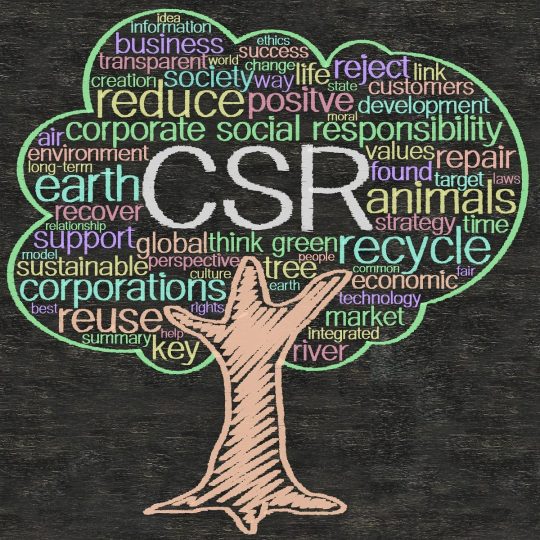According to the Companies Act which came into effect in 2013, companies with a net worth of Rs 500 crore on revenue of Rs 10,000 or net profit of Rs 5 crore on revenue of Rs 10,000 or net profit of Rs 5 crore should spend 2% of their average profit in the last three years on social development such as health and sanitation, poverty alleviation, among others listed in Schedule VII of the rules.

With the implementation of Corporate Social Responsibility (CSR) in India, not much has been changed in patterns of spending by the top 100 National Stock Exchange (NSE) listed companies. While the education and healthcare sector has been rapidly attracting eyeballs of CSR Funding, Maharastra still sees the maximum inflow of CSR spends. The top listed companies still account for almost half of the total CSR Spends.
In the recent years, India inc. has increased its CSR spending in 2017-18 to Rs 9,034 crore, including activities such as the promotion of education, vocational skill development, environmental sustainability and development of slum seeing an increase in expenditure. Notably, CSR expenditure by the companies towards poverty alleviation and promotion of healthcare and sanitation has witnessed a drop in 2016-17, as the total spends on the activity fell to Rs 549 crore or 18.6% from 2,944 crores in 2015-16 to Rs 2,394 crore in 2016-17 according to a report published at The Indian Express.
According to a report from PRIME Database, the CSR Spending statistics of India states that while 1,091 listed companies spent amount to the tune of Rs 9,034 crore towards CSR in FY17, implying that Indian corporates under CSR expenditures are giving more priority on education and vocational skills. 2016-17 witnessed a Rs 591 crore rise in CSR spends from Rs 2,793 crore in FY16 to Rs 3,384 crore in FY17. Education and vocational skills account for 37% of the total CSR spend by the Indian Corporates.
Based on the CSR strategy of Corporates, other sectors that have seen a significant increase from education and skill development sector is the expenditure towards benefiting the armed forces veterans, war widows, and their dependents have registered the biggest increase in percentage terms. The spend has almost seen a jump of three times from Rs 24.5 crore in 2015-16 to Rs 73 crore in 2016-17.
According to report, the CSR spend growth towards armed forces veterans and dependents of martyrs is in accordance with the Government’s decision in November 2016 to double the compensation for widows and families of soldiers. Apart from these sectors, community development, infrastructure, social welfare, sports and slum development have also registered a significant increase in CSR spends.
As the companies have implanted Corporate Social Responsibility into their businesses, the value of working with CSR consultant is not always clear. In many cases, Corporates interested in CSR and are looking to attain sustainable goals, don’t feel the need to hire CSR consultants from outside. For them merely conducting an employee engagement activity will suffice the cause. However, there are some exceptions to CSR activities conducted for social development, as these include areas such as social audits of supply chains, environmental impact assessments, and measurement of social outcomes where third-party verification/assurance is appropriate and necessary. Overall, the objective should be to build internal CSR capacity wherever possible.
As there is a rapid rise in the CSR initiatives in India, finding suitable CSR consultants is equally not possible. There’s now so much choice that Corporates while searching for a perfect CSR consultancy have a hard time selecting the right CSR advisor.
However, a checklist for Corporates to keep in mind while selecting that right CSR consultant will definitely help to understand and conduct the best CSR activities in India. Here are the six criteria that are important.
- Work experience: One important aspect to keep in mind while selecting a CSR consultancy is the past record and work experience of the company. Have they worked for corporations and not-for-profit organizations? What kind of businesses have they worked with? A clear understanding of these is important while selecting the CSR consultant.
- Research Methodology: Understanding the method of research used by the identified CSR consultant is also important. Systematic study and analysis of collected evidence and data points with a linked and inclusive perspective to support the policy level decision making must be the specialty of the consultancy. It should be based on learning, analysis and should be action-oriented.
- Proper CSR-CSO partnership: A well captivated civil society organization with the required experience to implement the initiative must be given utmost priority by the consultants. Building a credible network of civil societies is crucial. A consultant must identify and select credible implementing partners with relevant experience for the programme and hold a command on community mobilization while also mitigating the risks when required.
- Understand your Social return on investment: Only having academic credentials and practical experience in business is not enough. CSR is all about bridging the gap between profit and purpose which means that the advisors must be capable enough to provide you an in-depth knowledge on how social change works. An efficient CSR consultancy helps the corporate identify how effectively the organization uses its capital and other resources to create value for the community.
- Diversity: Identifying the work scope and areas of work is equally crucial for a CSR consultant. One must understand that CSR consultants reflecting the internal and external audiences one needs to reach and influence. This means the consultant must have access to a wide range of different opinions and to people of different ages, genders, and culture.
- Building capacity: The best CSR consultants places itself to the highest degree of priority on putting themselves out of priority and concentrate on delivering outputs.




No comments:
Post a Comment